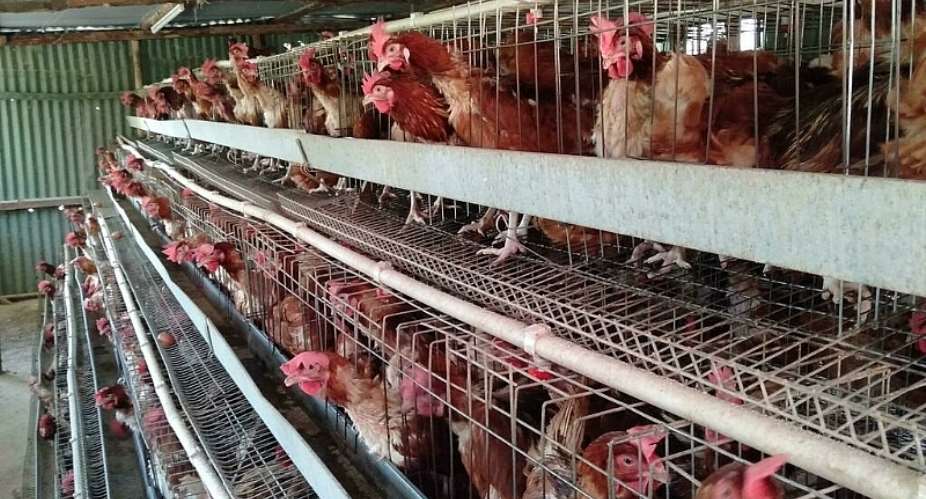Despite opposition from animal welfare organisations that battery cage poultry farming is cruel, this system is gaining traction among Kenyan farmers who argue they save on space and improve egg production. This is due to lack of land, high demand of eggs and curbing of human-animal conflict.
According to Stella Njoroge, one of the farmers who has adapted to this system, it is a game changer to her poultry farming.
In a space originally meant for 500 chickens, Njoroge now houses 2,500.
"I have done this type of system for a year now,” said Stella. “I had started with few chickens and I was doing them on deep litter, so I graduated to the battery cage system and there is a good margin on producing eggs.”
Striving to meet the high demand for meat and eggs, poultry are placed and reared in rows and columns of identical individual cages. Measuring 40cm high, 34 cm wide and 37 cm long, the cages are connected in a unit.
Stella notes that on average she can collect around 70 trays of eggs a day. She explains this is because she incorporates organic farming, where she uses the manure for other farming activities. “So it's a dual thing for me,” she adds.
"So, you can see it's five times to what I used to have before. There's a return on investment when you use the battery system.
Management
“And in this way I am able to manage diseases. I am also able to identify diseases early because as you walk around, you are able to see which chicken is sick, which one is not feeding well."
Such vigilance is not possible with the deep litter system in which chickens are raised on the floor covered with saw dust or litter to prevent birds from direct contact with the ground.
Peter Kinyua, another battery cage enthusiast, says that caging these chickens is a good thing because they cannot get sick easily.
He claims they are also less of a target for predators and thieves.
“In free range sometimes you cannot account for some eggs, so caging or deep litter system is easy to manage,” he said.
“We also don't overcrowd them because if you do, you will experience losses,” he added.
Animal cruelty?
On the other hand, Dr Victor Yamo, the campaign manager in charge of farming at World Animal Protection , disagrees with battery cage farmers.
He says the battery cage system in this country seems more favorable when compared with their poor production system, giving farmers an illusion of productivity.
"The battery cage system stresses the birds and causes diseases,” said Yamo.
“The bird steps on wire mesh and it stands on it for the rest of its life. It doesn't have the capacity nor the space to lie down and that leaves the bird with a lot of wounds.
- Goats for healthcare-- an initiative for pastoralists in Kenya
- Women in rural Kenya urged to shun old ways and use antiseptic on umbilical cord
"Not being able to exercise and have sunlight, the bird also ends up in a situation where the bone becomes weak.”
Veterinary research indicates that poultry kept in battery cages are more likely to break their bones.
“Currently, there is no single statute that regulates poultry farming in Kenya,” said Yamo.
“But there are animal bills in parliament yet to be made laws, despite poultry farming playing a major role in boosting our economy,” he added.
However, as animal welfare organizations continue to make the public more aware about the battery cage system, farmers say they will stick with the system until they find better ways to increase production.





 2024 election: Don’t be scared; we're ready to maintain law and order – Dampare ...
2024 election: Don’t be scared; we're ready to maintain law and order – Dampare ...
 NDC to officially outdoor Prof Jane Naana as 2024 running mate on April 24
NDC to officially outdoor Prof Jane Naana as 2024 running mate on April 24
 Power outages: Always give 3 days prior notice — PURC to ECG
Power outages: Always give 3 days prior notice — PURC to ECG
 NDC's quest to wrestle power from NPP goes beyond partisanship; it’s a national ...
NDC's quest to wrestle power from NPP goes beyond partisanship; it’s a national ...
 ECG board members slapped GHS5.8 million fine by PURC for failing to alert publi...
ECG board members slapped GHS5.8 million fine by PURC for failing to alert publi...
 I never left NPP, they 'sacked' me for attending Alan's programme; even a $100mi...
I never left NPP, they 'sacked' me for attending Alan's programme; even a $100mi...
 Fuel prices go up today
Fuel prices go up today
 Anti-gay bill: Your stance serves no purpose; either you actively advocate for t...
Anti-gay bill: Your stance serves no purpose; either you actively advocate for t...
 Tension brews as NPP Seattle clashes with national leadership over parallel chap...
Tension brews as NPP Seattle clashes with national leadership over parallel chap...
 Anti-gay bill: You've done nothing in Ghana to prove you're against LGBTQ+; ther...
Anti-gay bill: You've done nothing in Ghana to prove you're against LGBTQ+; ther...
